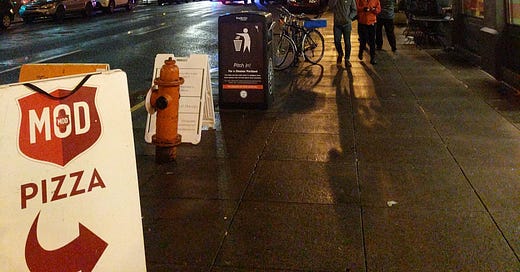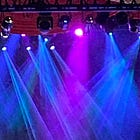So you thought you might like to go to the show
I watched a club become a show. It is not a place, it is an ephemeral moment. It will be everything. Then, it disappears. If you aren’t here now, you can never touch it.
This is the fifth in the Old Truck Good Coffee Volley series, in which Leo and Joel respond to each other’s essays with a piece of their own. In Hippie Mask, Leo memorialized COVID protection mindset in Montana. As I lived through the COVID lockdowns in Portland, it was a fascinating contrast. Also, he went to a show, which reminded me what live music meant to me living in a small town…
… to feel the warm thrill of confusion, that space cadet glow.
We were in Cat's Bronco II, a strangely short and tall four wheel drive vehicle of the late 80s. There were four of us along, heading over the pass for a show. It was 1992.
There was snow, it was dark. Something happened to the engine around the small mountain town Government Camp, near the summit by Mount Hood. Cat was not getting any power as she pushed down on the accelerator. We pulled over to the service station at the summit. She popped the hood and Travis and I peeked our head in there, doing fine imitations of our fathers looking at engines. As we talked and poked around, Cat and the other woman went to the gas station and bought a can of additive to remove water from the fuel line. They applied it and the engine started up fine. We continued to Portland.
Shadowy people moved around the wet streets as we hustled from the parked car to the venue entrance. I had no mental map of the city then. I had no idea what it was going to be like when we stepped out of the Bronco. I was surprised that the city was navigable, but it certainly did have a wet, Gotham feel to it. My teenage attention collected everything. Every cracked sidewalk and old dirty building was brand new. A row of buttons to call up to each apartment. Parking tow away zones. A broken window with cardboard behind it.
The show was at La Luna, which had been the Pine Street Theater and then RCKNDY. My older brother had reported on many shows he had seen at Pine Street over the years, coming back home after a punk or rock show in the big city. We made him tell us everything. It seemed legendary to me.
We were very early and walked into the wide open space, noted the stage on one side bracketed with black speakers. Old theater seats, their spring-loaded lowers pointing up, lined the edge of the room. Upstairs was a bar, 21 and over, off limits to us.
After the opening band, the house lights came up. There was not enough seating in the all ages area, so people sat in circles on the ground. I noted that as I noted everything of the city as distinctive and important.
This process became familiar to me years later, but this was one of the first times I watched a club become a show. It is not a place, it is an ephemeral moment. It will be everything. Then, it disappears. If you aren’t here now, you can never touch it.
This is how it starts: house lights lower, shadows arrive on the stage, preliminary instrument sounds jostle over the sound system (one bass drum, two taps on the tom, one quickly-deadened open E string), then the visual and auditory burst across our face we came for. I held my breath. Travis jumped up and down like an excited and extremely stoned child — because that is exactly what he was at that moment. He wore, as he usually did, combat boots, faded dress slacks, and a thrift shop dress shirt that he had torn the collar off of. We were, I am sure, of a piece in dress. I couldn’t tell if we fit in here. We stood out at home, that is for sure.
These were songs we listened to daily, that brought us to tears and kept us awake on the road, that wiped the school day away. Smoking in the canyon across the street from the school, we sing lines from this album to each other, aping The British accent of The Sunday’s Harriet Wheeler.
I looked at Travis. His face was toward the stage, tipped back, eyes half lidded, lips tight together. I was the same, released from all the discord as Harriet Wheeler’s smooth, sweet, searing voice came out upon us.
As fast as a high school fight , someone jumped up on the stage to get to Wheeler. This body moved up and towards her, a very slight woman with just a mic stand between her and us. A bouncer was on the invader just as fast. The two tumbled into the crowd. Through an instantly ferocious face, the guitarist yelled something back at the would-be adorer. Spittle showed in the lights.
Other than that moment, I kept my head tipped back, my thrift shop trench coat flipped open. I sang along and blissed blissed blissed.
After the show we drove back three hours over the mountain.
There is a Grange Hall in a lonely intersection of backroads in Central Oregon. Someone booked it that same year for a metal show. We were no metal fans, but Travis and I went. We wanted to stand in an audience during a show. The bands were terrible. We tried to like them anyway. I spent a good amount of the show smoking cigarettes and talking outside in the gravel parking lot, the white paint of the building peeling just a bit more from the ragged thumping emanating out of it.
In another Grange Hall, in the Applegate Valley some years later, the odd makeup of the surrounding countryside community gathered for a show by a band from nearby Ashland. There was a potluck, the kids where all there, and no matter how bad your rhythm or what you were dressed like, you danced. A man in jeans with a very long knife sheathed on his belt. Another man in tie dye with his dreads wrapped tall in a cloth. They did their thing. The kids whirled and tried to get their bodies to move in accord to the music, to the encouragement of their moms. It is something to behold when people who live remotely come upon the rare live music event. Their fun-having is aggressive, as though they would burst into flames if they didn’t dance. They are not critical of the music, just grateful.
If you are in a city of any size and open a local free weekly zine, there are probably dozens of shows every night. Some get two paragraphs to describe them, some two sentences. They tell you that every night musicians set up to play for an audience. These tidbits make the moment common, hard to remark upon at all. They warrant teeny eight point font with keywords that signal genre and popularity.
Each one represents a dark room with attendees, some not jaded. Hopeful for a bright hot moment of music working for them. Some are local bands, some drove in this morning and are leaving this night for another show elsewhere.
In Portland, twenty years after that night in La Luna, my girlfriend lived in the basement of a former church in Southeast. Her roommate was a cellist at a time where cello had become the ideal guest musician for every band in Portland, like I imagine steel guitarists are in Austin. For a lark, he got all his cellist friends together and started practicing pop songs in the living room with them, forming the Portland Cello Project before my very eyes. They still tour and are an event to celebrate in places like Helena Montana1.
Perhaps that experience with Cat and Travis at La Luna was what taught me what I wanted and why I came to the city. I pored through those tiny text descriptions to find which ones would give me that blissed, tipped-back-head time in a dark crowd. Living in Portland, that ceased to be a scarcity. One Tuesday, I noticed that a musician that I liked was playing downtown. I biked down, paid the cover, and sat at the bar talking to a local musician that I had ran into there. I don't know that I even mentioned the show to anyone the next day.
Y La Bamba was playing one night at The Doug Fir, a venue just a few blocks from where La Luna then lay fallow. Local to Portland, Y La Bamba had just got back into town after touring to open for high profile bands. I myself got back into town from a trip of my own just in time and rushed down. The venue was in the basement of a restaurant, but it was an elevated room that night. We all were lit up by the revelation of those songs thrown out upon our heads. I remembered to do one of my favorite show habits; from my place towards the front of the standing crowd, I turned around to see the faces played over by reflected stage light. Some eyes gaping, some eyes closed. Some mouths singing, some frowning. I am one of us.
Thank you so much to all of our readers. It is a joy to share the tailgate and conversation with you. Feel free to reach out with chat or personally and tell us what you think. Better yet, tell someone else!







Words can fail in the face of nebulousness. This piece is a blueprint for the successful transaction: Look at the foundation, at the edifice, but never at the roof. That's where The Show happens. And if you look too soon, it's not there. Good writin'.